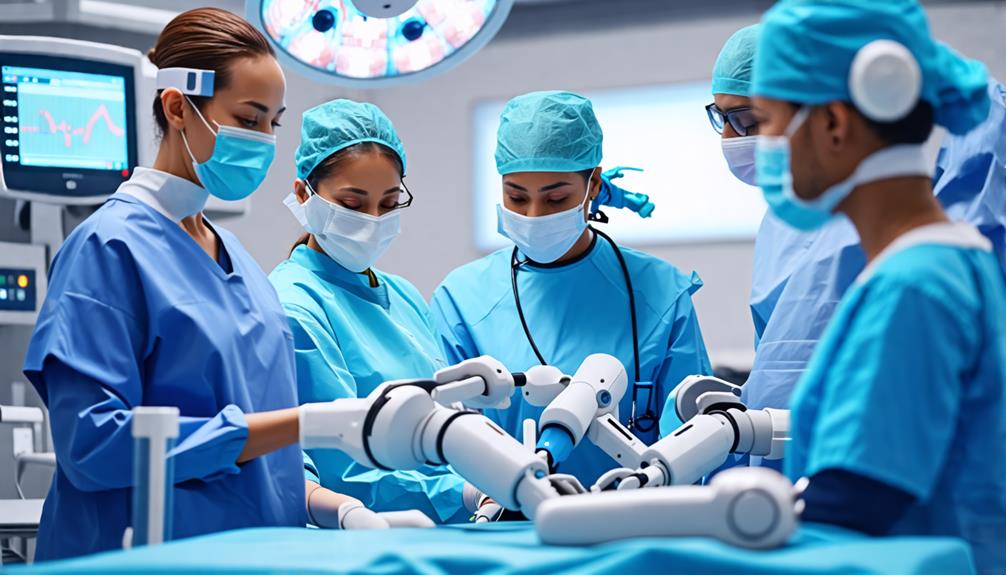
If you're hunting for the highest-paying positions in medical technology, you'll want to look closely at a few standout fields. Biomedical engineers lead with potential earnings well over $100,000, thanks to their role in designing lifesaving devices. Not far behind are medical device sales executives, who can significantly boost their base salary through commissions. You're also set for a lucrative career as a clinical informatics analyst, where interpreting complex medical data plays into a strong salary. Dive deeper into each profession to understand their unique roles and how they achieve these high earnings. There's more to explore about how each specialty aligns with your career goals.
Radiology and Imaging Specialists

Radiology and imaging specialists play a crucial role in healthcare, utilizing advanced technology to diagnose and monitor various medical conditions. You, as a professional in this field, leverage sophisticated equipment like MRI machines, CT scanners, and X-rays to provide vital information that supports the decision-making processes of physicians. Your expertise not only helps in identifying issues such as fractures and tumors but also plays a pivotal role in the ongoing assessment of patient treatment plans.
Your skills are in high demand, and this is reflected in your salary. In the U.S., you can expect an average annual salary that significantly surpasses many other healthcare roles, often ranging between $60,000 to over $90,000, depending on experience and location. Furthermore, specialists with additional certifications in complex imaging techniques may earn even more.
Staying updated with the latest advancements in imaging technology is essential for maintaining your competitive edge. Continuous education and training not only enhance your proficiency but also boost your earning potential. As healthcare continues to evolve, your role becomes increasingly critical, making your career choice not just rewarding but also financially lucrative.
Biomedical Engineers
Biomedical engineers, with their innovative prowess, significantly enhance healthcare by designing solutions that improve patient care. You're stepping into a field where your ability to merge the realms of medicine and engineering not only boosts your potential earnings but also positions you at the forefront of medical innovation.
As a biomedical engineer, you'll develop devices and systems ranging from artificial organs and imaging machines to surgical lasers and advanced prosthetics. Your work ensures that these innovations are safe, effective, and accessible, directly impacting patient outcomes and the efficiency of medical procedures. This role isn't just about hardware; you might also find yourself working on the next generation of biomedical software, which is crucial for the functionality of these high-tech instruments.
The financial rewards are compelling. You can expect an average salary that's competitive within the tech field, often ranging between $60,000 to over $100,000, depending on your experience and specialization. Areas with higher costs of living typically offer higher salaries, reflecting the demand and cost of innovative medical technology development.
Clinical Informatics Analysts

How can you leverage data to transform healthcare?
As a clinical informatics analyst, you're at the helm, turning vast amounts of medical data into actionable insights that improve patient outcomes. Your role is pivotal in interpreting complex datasets to streamline hospital operations, optimize treatment plans, and enhance healthcare services.
You'll dive into electronic health records, extracting and analyzing data to support clinical decisions and policy formulations. By ensuring data integrity and compliance with healthcare regulations, you safeguard patient information while contributing to medical advancements. Your expertise not only impacts patient care directly but also influences the broader scope of public health initiatives.
In terms of compensation, you're looking at a lucrative career. Median salaries are impressive, reflecting the critical nature of your work and the specialized skills you bring to the table. You've got the potential to earn even more as you gain experience and take on higher responsibilities.
Furthermore, as technology evolves, so does your career landscape. You'll need to stay updated with the latest in healthcare tech and data analysis tools. This ongoing learning process not only secures your position but also propels you towards advanced opportunities in the field.
Genetic Counselors
In the evolving field of healthcare, genetic counselors play a crucial role in interpreting genetic data to guide patients and families through complex health decisions. You'll find this career not just fulfilling but also well-compensated due to its specialized nature.
As a genetic counselor, you'd be at the forefront, using your expertise to analyze genetic information that can predict and treat genetic disorders, informing patients of their risks for various diseases.
Your role involves more than just interpreting data; you're also a communicator, tasked with explaining complex genetic concepts in understandable terms and providing emotional support as patients navigate their options. This requires a blend of scientific knowledge and interpersonal skills, making your job both challenging and rewarding.
Financially, it's a promising field too. With a master's degree typically required, your investment in education is significant, but so are the returns. Salaries for genetic counselors have been steadily rising, reflecting the increasing demand for personalized medicine and genetic testing.
Medical Device Sales Executives

Medical device sales executives play a pivotal role in connecting cutting-edge medical technologies with healthcare professionals who need them. If you're considering a career where your sales acumen meets your passion for healthcare, this might be the perfect path. You'll be the bridge between the latest medical devices and the doctors, hospitals, and clinics that use them. Your ability to understand complex products and articulate their benefits effectively is crucial.
In this role, you're not just a salesperson; you're an essential part of the medical community. You provide the tools that enable better patient outcomes. That's a responsibility you'll carry every day, along with the potential for substantial earnings. Typically, your compensation includes a base salary plus commissions, which can lead to a lucrative career, especially as you gain expertise and establish relationships in the industry.
You'll need to stay on top of industry trends and continuously update your product knowledge to keep up with advancements in medical technology. Networking is key, and attending industry conferences can be a goldmine for the latest information and connections.
It's a demanding job, but for the right person, it's incredibly rewarding, both professionally and financially.
Prosthetists and Orthotists
Prosthetists and orthotists design and fit medical supportive devices, directly impacting patient mobility and quality of life. If you're considering a path in this field, you're looking into a career that not only pays well but also brings immense satisfaction through helping others regain their independence.
The average salary for prosthetists and orthotists can vary significantly based on experience, location, and the type of employment setting. Generally, you'll find that entry-level positions start around $50,000 annually, with experienced professionals earning upwards of $100,000.
You'd be working closely with patients who've lost limbs or have mobility issues due to illness or injury, creating customized devices like prosthetic limbs or orthotic braces. It's a role that combines creativity with technical skill, as each device must be tailored to fit the individual's specific needs and lifestyle.
Educationally, you'll need at least a master's degree in prosthetics and orthotics followed by a residency program. Certification is also required, which involves passing rigorous exams. It's a demanding career path but one that offers a stable job outlook and the opportunity to make a significant difference in people's lives.
If you're passionate about blending healthcare with innovative technology, this could be the perfect fit for you.
Frequently Asked Questions
What Are the Risks of Working in High-Paying Medical Tech Fields?
You'll face increased stress, burnout, and ethical dilemmas in high-risk medical tech areas. These fields demand long hours and constant learning to stay abreast of rapidly evolving technology and protocols.
How Do Job Satisfaction Levels Compare in These Roles?
In comparing job satisfaction across roles, you'll find it varies significantly. Factors like work-life balance, stress levels, and personal interest in the field greatly influence how content you feel in your job.
What Ethical Dilemmas Do Professionals in These Fields Face?
You might find that professionals in medical tech often grapple with ethical dilemmas such as patient data privacy, consent for experimental treatments, and balancing profit motives with patient care responsibilities.
How Does Gender Diversity Impact Salaries in These Sectors?
In medical tech, your gender can influence your salary. Studies show that women often earn less than men, highlighting the need for increased gender diversity and equity in salary structures across the sector.
What Are the Typical Career Progression Paths in High-Paying Medical Tech Jobs?
In high-paying medical tech jobs, you'll typically start as a technician, then progress to specialist roles, eventually moving into management or advanced research positions, which often require further education and certifications.
Conclusion
You're on the path to discovering which medical tech roles rake in the highest earnings.
Radiology and imaging specialists lead with their crucial diagnostic skills.
Biomedical engineers follow closely, innovating life-saving technologies.
Clinical informatics analysts, genetic counselors, and medical device sales executives also offer lucrative opportunities.
Don't overlook prosthetists and orthotists, who combine expertise and empathy to enhance lives.
Each role not only promises a substantial paycheck but also a chance to make significant impacts in healthcare.






